
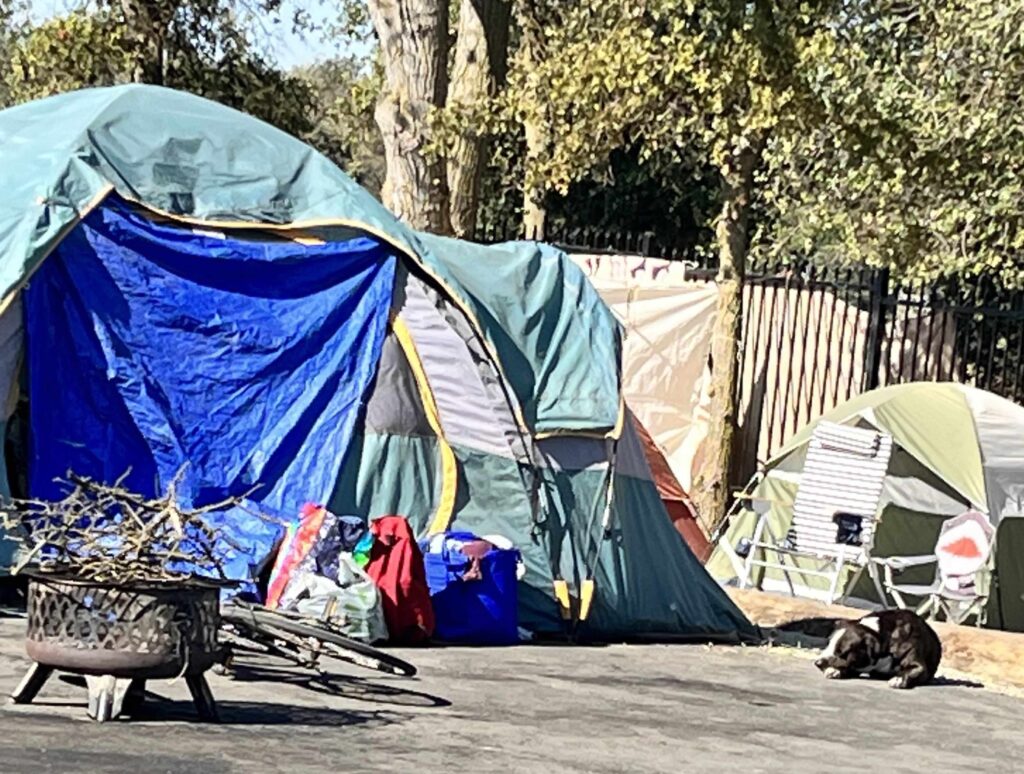
Mass homelessness shows, by its very existence, that the dominant political policy today is abandonment and criminalization. The elected officials who are charged with protecting and maintaining the welfare of all in times of disaster and crisis are the ones who are calling for the criminal prosecution of this low-income and low-wealth population, even while giant corporations receive lavish subsidies and war is funded with a reckless outpouring of public dollars.
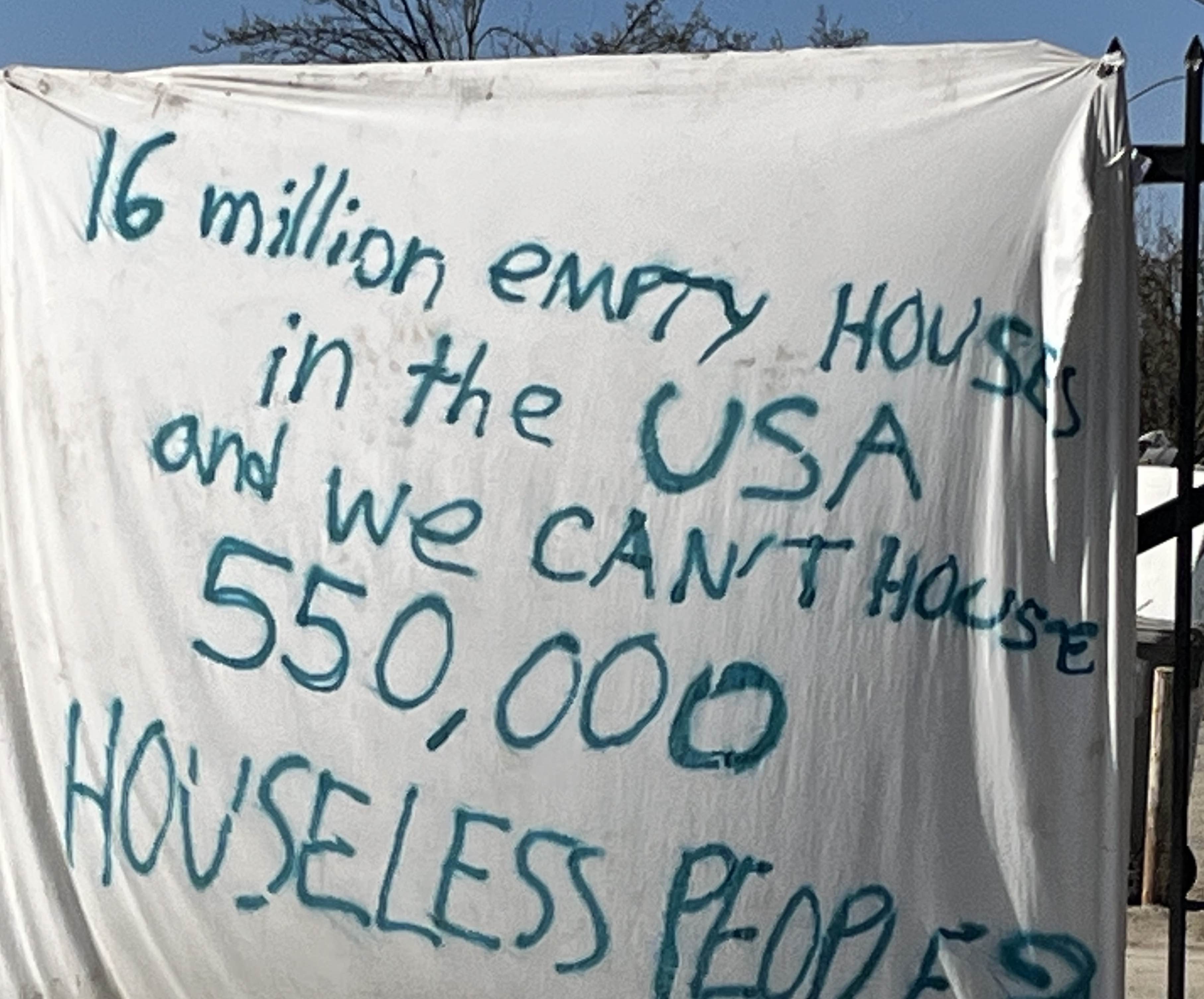
Sacramento voters, misinformed and misled, have now passed Measure O, a new ordinance that attempts to outlaw being unhoused and living outside. In passing this measure, which is similar to the “anti-camping” ordinances that have been on the books since the 1990’s, Sacramento joins many other cities. Yet the cost of enforcing these laws is huge; and enforcement compounds increase the harsh conditions experienced by those who are found “guilty” of not being housed.

Even though punitive laws are multiplying along with the numbers of homeless people, homelessness cannot be “outlawed.” At the most fundamental level, the cause of homelessness is economic inequality – dire poverty. If people cannot afford housing because they are too poor to pay the rent, they have to live outside, bringing into public view their vulnerability in this richest of all countries in the world.
Needless to say, these laws do nothing to address the conditions that have forced millions to live outside – while the official point-in-time count nationwide is ½ million, it is widely acknowledged that across the country the actual number of unhoused ranges between 1 and 5 million people. Indeed, the numbers are multiplying every day, every week, every month. No one really knows how many.
It Is Cruel and Unusual to Treat Living Outside as a Crime
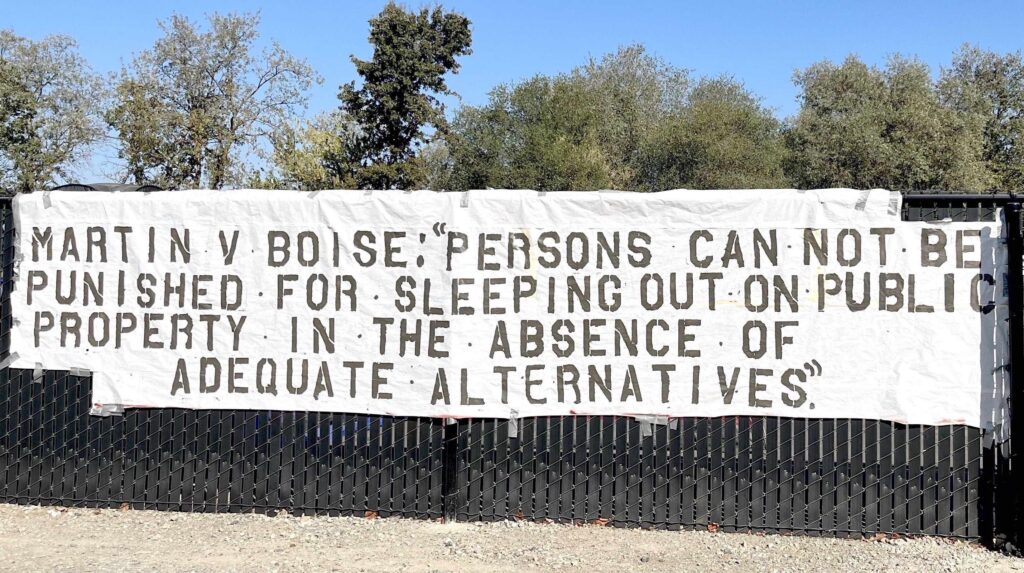
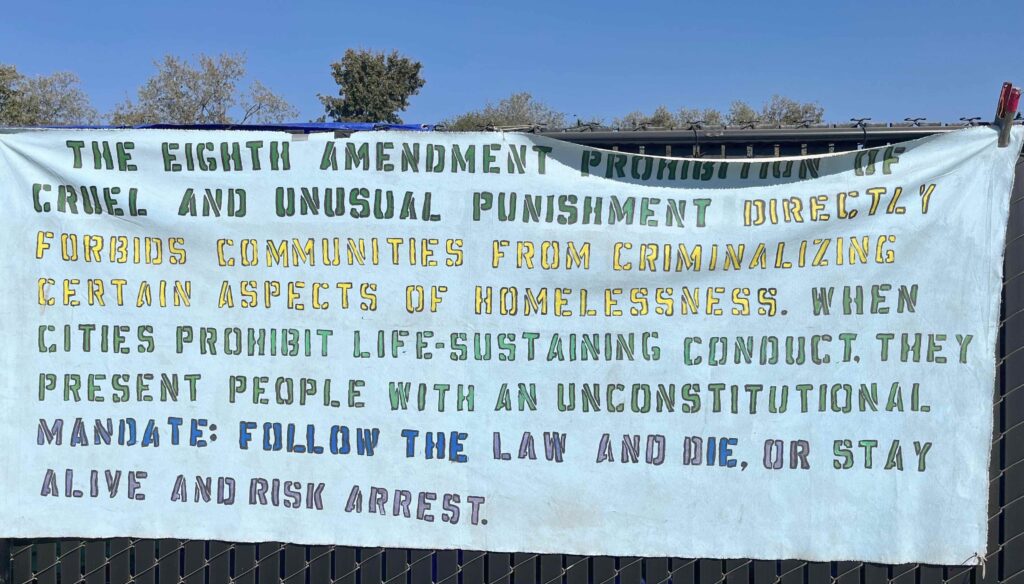
The federal courts are not known to be radical, but the case of Martin v. Boise, which has established constitutional restrictions on punishing the homeless in California and other western states, has recognized the obvious truth that the condition of being unhoused is not “voluntary.”
The Boise court (the Ninth Circuit Court of Appeals) has ruled that the U.S. Constitution’s ban on cruel and unusual punishment protects unhoused people from being punished for living outside precisely because this condition is involuntary rather than a matter of choice and free will. This is why it found that adequate shelter and housing must be made available before the police are brought in for the purpose of forcing unhoused people to relocate with the threats of citation and arrest.
Measure O’s intended purpose is to eradicate – abolish, destroy, bulldoze and displace – visible encampments at the same time that it accomplishes an “end run” around the housing and shelter requirements of Martin v. Boise. It provides for 600 “spaces” (most presumably located outdoors) which do not, of course, exist – tiny areas smaller than a parking space.
The provisions of Measure O betray its real purpose – to avoid the impact of the Martin v. Boise case by making a gesture toward the requirement that shelter or housing be made available before any unhoused person is threatened with criminal punishment – citation, arrest, or jail.
Measure O cannot pass constitutional muster because of, among other things, the inadequacy of the shelter which is to be offered to unhoused people who are being evicted from their campsites under threat of criminal prosecution. Measure O has already been challenged in court for this deficiency, and our unhoused population will continue to vigorously assert their rights under the U.S. Constitution.
Camp Resolution Has Won A “Pause” From Eviction
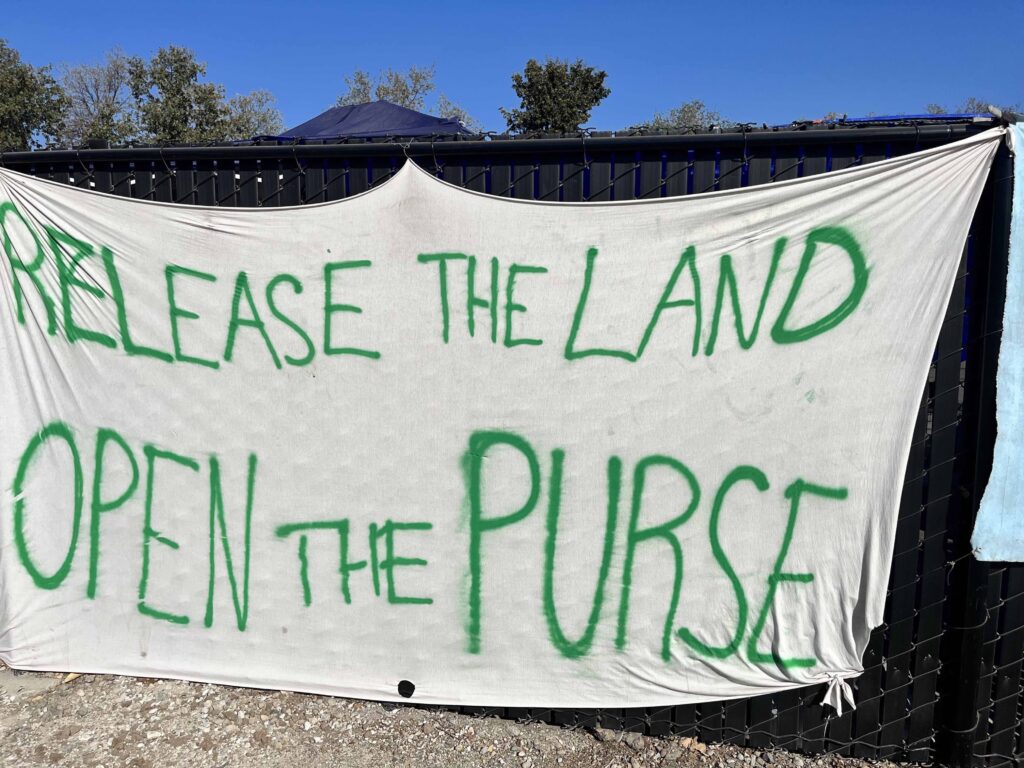
Even as Measure O was passed by the voters on election day, mandating massive police-driven attacks, organized resistance to police destruction of encampments reached a new level in Sacramento. Unhoused residents of an encampment they named “Camp Resolution” in the northern part of the City have held their ground.
This camp was established in defiance of the City. The City spent $617,000 to prepare the site as a settlement for unhoused people, but then officials changed their minds (making various excuses) and closed down the site. Those who had been promised safe parking and camping at that spot moved in anyway.
In response, the police posted notices warning that the residents would be removed as “trespassers” by November 11, 2022. Residents publicized their objections; supporters and allies rallied to the cause. As a result, a delay until November 16 was announced. In these few days, residents and their allies organized dozens to speak out at a City Council meeting, packing the Council chambers, the night before the scheduled eviction in defense of “Camp Resolution.” Hundreds signed a community letter and sent written testimonials and emails demanding that Camp Resolution be left alone.
Making the point that eviction means a death sentence – one severely ill and disabled resident is convalescing at the camp in a hospital bed, cared for by others – the resisters carried the day and won a “pause” of the eviction. At present, allies are maintaining vigilance, taking shifts at the camp day and night, working to support the residents in their autonomy and self-governance, and providing mutual aid.
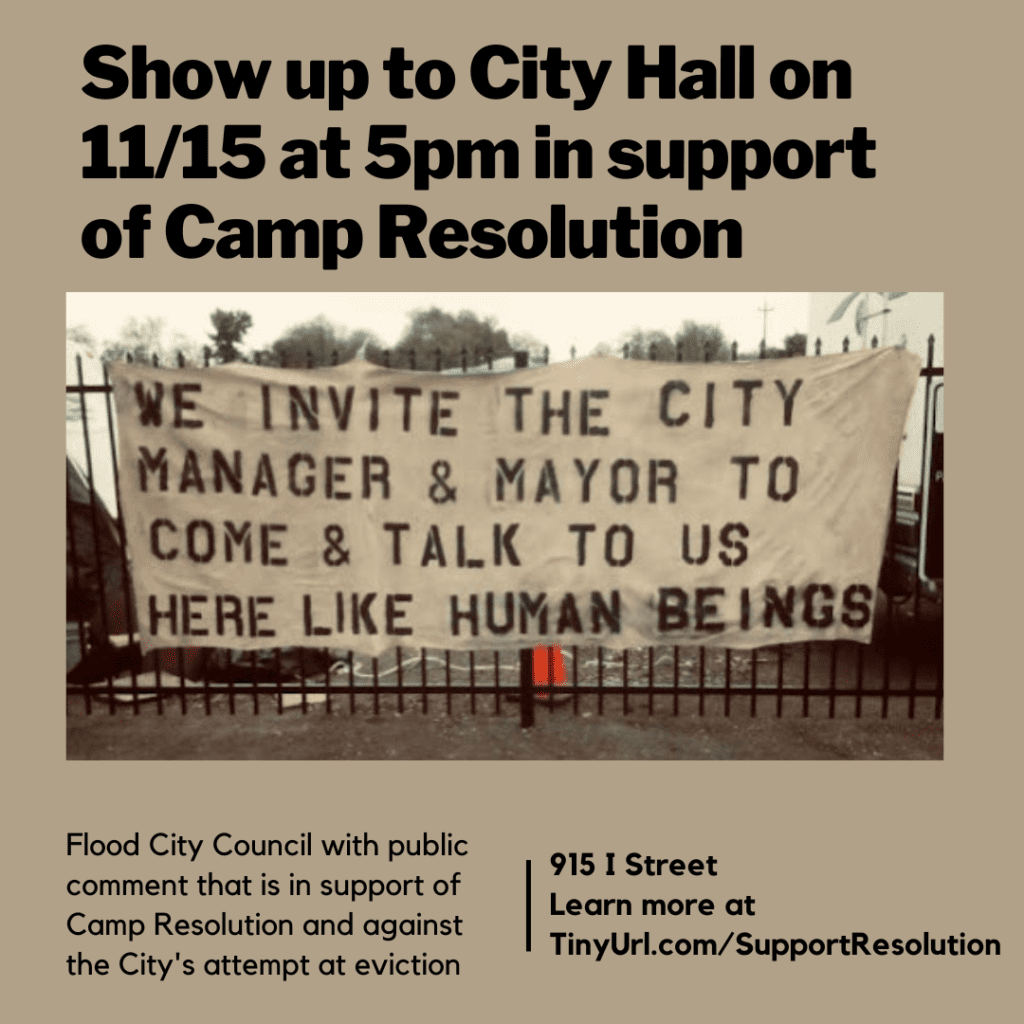
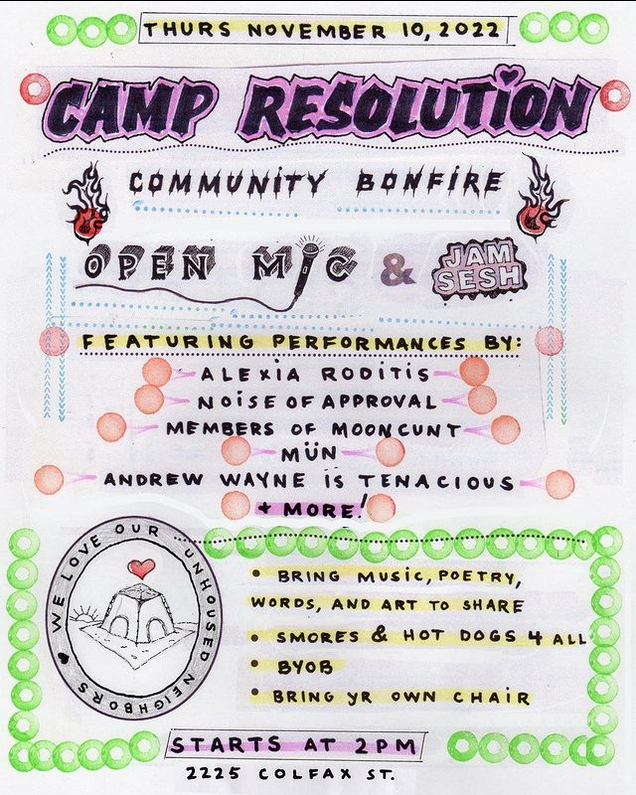
Even though Measure O has now become law, its absurd premise – that living outside can be outlawed during a housing crisis – will lead to its constitutional invalidation and practical failure. The movement for housing is in fact becoming stronger, and the public is becoming more conscious of the need for housing, as the numbers of unhoused people increase. Indeed, the residents of Camp Resolution have posted quotations from Martin v. Boise all along the fences and walls of their camp.
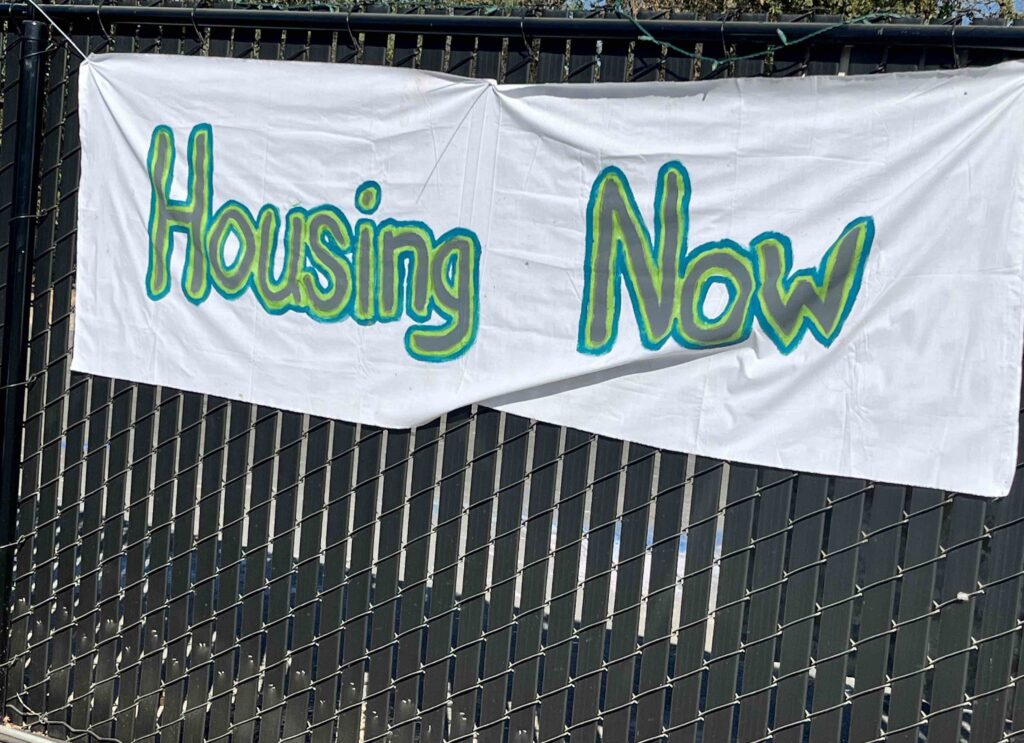
Stay posted for further developments!

La luta continua.
Thanks for posting this great article by Cathleen. I will share- all hands on deck to support unhoused people in Sac and accross the country- and to protect from arrest and harassment